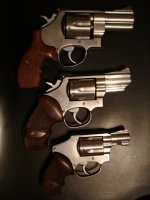CommissarHark
Inactive
I'm not here to spark a debate, I do not one a war in my thread. I cannot stress that point anymore. DO. NOT. START. A. FIGHT.
Moving on to my actual question. I own a Pietta reproduction 1858 Remington, a pair of them actually, one is pure blued steel the other has a lovely case hardened frame. I have converted the case hardened one with a .45 LC cylinder, and a loading channel. I want to convert the blued one as well. I purchased for it though, the .45 ACP cylinder, listening to everyone everywhere wax poetically about how it is the best handgun cartridge ever. However I was looking at my "Bible" (Lee Loaders Hand Book) and I realized that I am getting a lot less performance out of the .45 ACP, compared to my .45 LC loads, for almost 6000 psi more in pressure. Now 18000psi cannot be good for my gun, so I wonder what the point is in me having .45 ACP. I'd like real experiences with either, or both cartirdges, and any advice. I plan, currently, on returning the .45 ACP cylinder, counting the restocking fee, and purchased rounds as a loss, and purchasing a proper .45 LC cylinder to pair the guns. Any advice, or knowledge on the subject would be greatly appreciated, I only have until next Monday, 9/16/13 to make my decision before I'm over the limit for the return policy.
Moving on to my actual question. I own a Pietta reproduction 1858 Remington, a pair of them actually, one is pure blued steel the other has a lovely case hardened frame. I have converted the case hardened one with a .45 LC cylinder, and a loading channel. I want to convert the blued one as well. I purchased for it though, the .45 ACP cylinder, listening to everyone everywhere wax poetically about how it is the best handgun cartridge ever. However I was looking at my "Bible" (Lee Loaders Hand Book) and I realized that I am getting a lot less performance out of the .45 ACP, compared to my .45 LC loads, for almost 6000 psi more in pressure. Now 18000psi cannot be good for my gun, so I wonder what the point is in me having .45 ACP. I'd like real experiences with either, or both cartirdges, and any advice. I plan, currently, on returning the .45 ACP cylinder, counting the restocking fee, and purchased rounds as a loss, and purchasing a proper .45 LC cylinder to pair the guns. Any advice, or knowledge on the subject would be greatly appreciated, I only have until next Monday, 9/16/13 to make my decision before I'm over the limit for the return policy.


